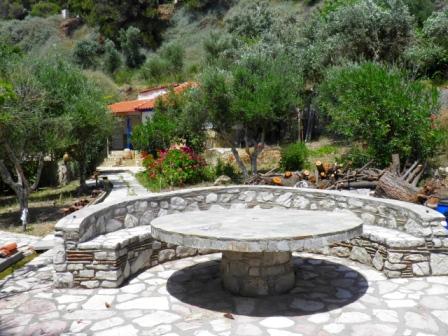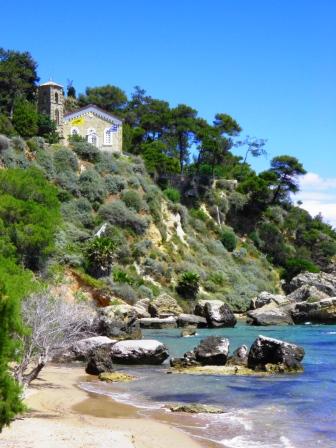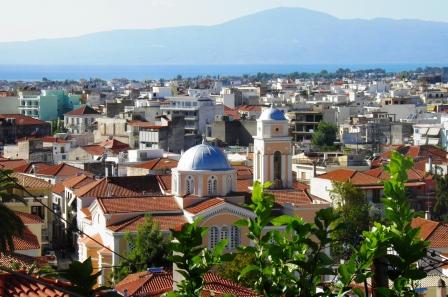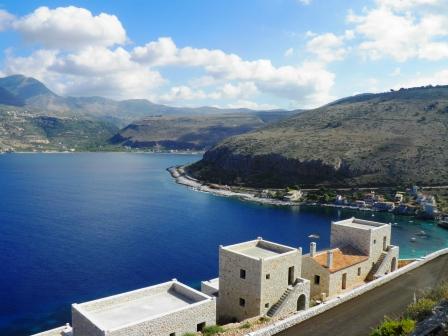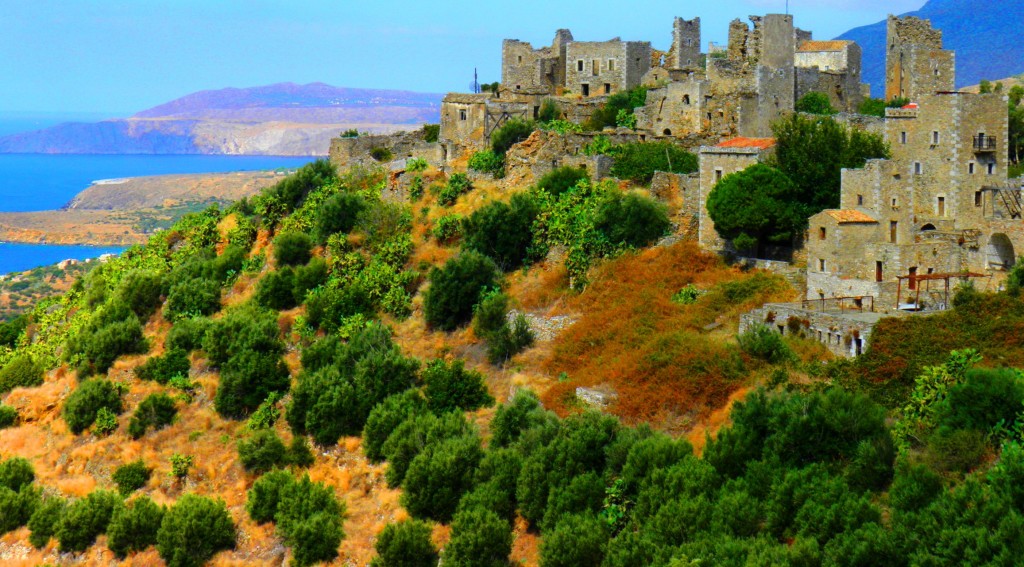WE had an experience recently in Koroni that brought home to me the enduring, sometimes fateful connections between American and Canadian Greeks and their homeland.
Not long after we arrived back in Greece this year, this time at the tip of the Messinian peninsula in the southern Peloponnese, we started visiting a small, secluded beach on the other side of Koroni, facing the Ionian Sea. At the back of sandy Zaga beach is a set of stone steps and we were intrigued enough to climb them and discover what lay beyond – a white house with a large shady garden.
Its best feature by far was the huge round table made of stone on a thick plinth and a curved stone bench around one side that could easily fit a dozen or more people. The place gave the sense of Greek ownership and I could imagine a big, garrulous family sitting here on hot summer days sharing a meal. Perhaps it was owned by Athenians who only came in the high summer.
Every time we went to the beach we pondered who the owners were. But in a quirk of fate, I was to find out sooner than I could ever have imagined.
After my book Things Can Only Get Feta was published in North America on May 1, I had a few emails to the website from readers, and one in particular from a lovely woman called Alexia from Montreal, Canada. She had a particular interest in the book as her family originally came from Kalamata, and the rural Mani. We exchanged several emails and she told me she had spent a few summers back in the southern Peloponnese visiting relatives and friends.
Since I mentioned living in Koroni, she sent me a photo of her father on a beach here – and I recognised it straightaway. Zaga, the beach with the stone steps. I quizzed her about the house and, sure enough, it was owned by a Canadian friend of her father. Small world. She had been to the house in the past and had had one of those long summer lunches, just as I had imagined.
It was certainly a spooky coincidence, you might think, but not where Greece is concerned. The longer I stay in this country, the more I recognise the tight webbing between Greece and the Greek diaspora (fittingly a Greek word) of Canada and America, and Australia too; the families who had to leave, mostly for economic reasons, though sometimes political, sometimes in a desperate bid for freedom, who have never forgotten their faith, their culture and whose connections between the two places continue to spread and flourish.
In the past year I have had many North Americans becoming regular correspondents and FB & Twitter friends, especially among those whose families came originally from the southern Peloponnese. I am always impressed and touched by their passion for Greece, how the more recent emigrants from the past four decades talk about the place as if they’d never left it, sharing pictures on FB, reminiscences and anecdotes. Many talk longingly of their next visits in the summer, counting off the days, even though most have successful, happy lives in North America. But to these people, Greece is still their patrida, their homeland.
As Alexia explained: “My Dad has shared so many stories of his childhood and of his teenage years (in Greece). His father, who passed away the year I was born, shared stories of the war he lived through. He planted the trees at the Anastasi (church) on Navarinou Street in Kalamata. My uncle Soulis dove for the cross in the water for the Epiphany holiday (in January) when he was a teenager. Crazy to feel so connected to a place that my brother, sister and I have only visited a handful of times.”
It makes me think a lot of my own family and how closely it parallels emigration from Scotland, and the Scottish diaspora. After historic skirmishes with the English and from the time of the infamous Highland Clearances of the 18th and 19 centuries when tenant farmers were evicted from their land, Scots have been leaving the country in droves seeking political and economic refuge mainly in North America, Australia and New Zealand.
More recent departees, like my family, left to seek new opportunities in Australia in the 1960s, lured by assisted migration, the famous £10 boat ticket to freedom. Despite decades in Australia my family always called Scotland ‘home’. “We’re going home next year for a holiday,” they would tell their friends, as if the permanent lives they had so painstakingly etched out in Australia were nothing but a temporary fix. Which they weren’t.
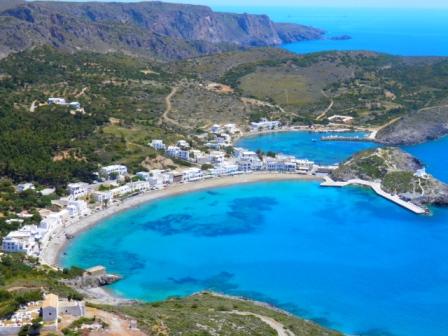
Gorgeous Kapsali beach on the island of Kythera. The island has been dubbed “Little Australia” because of the number of villagers who migrated there and then returned
Greeks are everywhere in the world, in every far-flung corner, and so are the Scots. Two very different diaspora – Greeks and Scots, but we both do exile very well.
But what the Scots don’t do is keep up the cultural life of their homeland the way the Greeks do. Perhaps if we had the vast extended families that Greeks have, we would. We tend to float away into our individual lives and endeavours and in a few generations our Scottishness is often diluted. Not so the Greeks.
I have followed my North American friends’ posts on FB and Twitter with admiration and often envy: how they have built Greek Orthodox churches to rival many in Greece and sent their kids to Greek language school, kept up the rituals of Easter, the saints days, name days, and all the Big Fat Greek weddings. Greekness is alive and well in North America. A massive achievement. How could it be otherwise?
Yet for all that, they often talk of an intense longing for what they or their family have left back in Greece and the things that can never be replaced. Some of this sentiment was conveyed beautifully by Katie Aliferis, a Greek American from San Francisco, in some of the poetry she shared earlier in the year on my blog. Her poems express an intense love and longing for the remote Mani region in the southern Peloponnese, and for her village of Areopolis and the old family home, even though Katie has, remarkably, never set foot in the country.
Most Greeks would probably never have chosen to leave their homeland and you understand this better when you see some of the outstanding places they hail from, physically beautiful with a traditional, often rural, way of life that can’t be replicated anywhere else, and villages that are now semi-abandoned, ironically due partly to the mass migration.
While living in the Mani we came across a semi-deserted hillside village that was hosting a big Greek wedding for a family from Chicago. It was, unusually, filled with noise, music, life, and for a few days, the small Greek population was vastly outnumbered. Some of the Greek villagers remarked that it all felt like old times.
Wars and occupation have driven out the Greeks, so did the military junta of the 60s and 70s. But also earthquakes, like the devastating Kalamata earthquake of 1986, and the recent economic crisis has tragically forced Greeks to leave yet again, seeking opportunities elsewhere. These circumstances will no doubt inspire a painful longing to return one day and to never forget where ‘home’ really is, despite making wonderful lives in their new host countries. Whenever I hear an American accent now in the Peloponnese I am more attuned to the complex stories behind the sunny repartee.
My new Canadian friend Alexia says she will be back this summer, as will some of her family. They will visit their ancestral homes and also Koroni. A lunch around the stone table at the house by the sea will probably be on the cards. In my mind I can already see them crammed around it, full of kefi (high spirits) sharing a typical Greek meal, under shady trees, the sea a few stone steps away. The circle will then be complete.
GREEK BOOKS
My two travel memoirs about living in southern Greece, Things Can Only Get Feta, and the sequel Homer’s Where the Heart Is are available in Kindle and in paperback through all Amazon sites
www.amazon.co.uk or www.amazon.com
For more information about the books and other outlets please visit the book page on my website www.bigfatgreekodyssey.com
Thanks for stopping by and your comments on the blog are always appreciated.
© Text and photographs copyright of the authors 2016. No content/text or photographs may be copied from the blog without the prior written permission of the authors. This applies to all posts on the blog.

